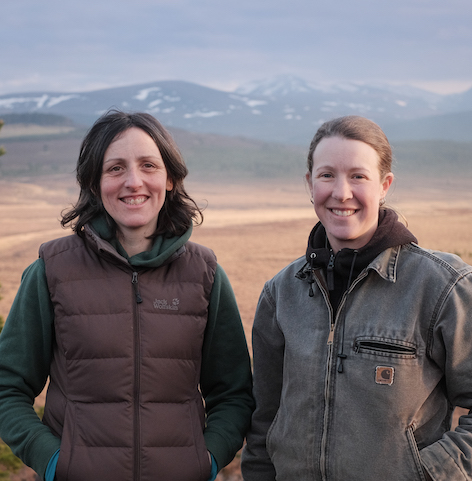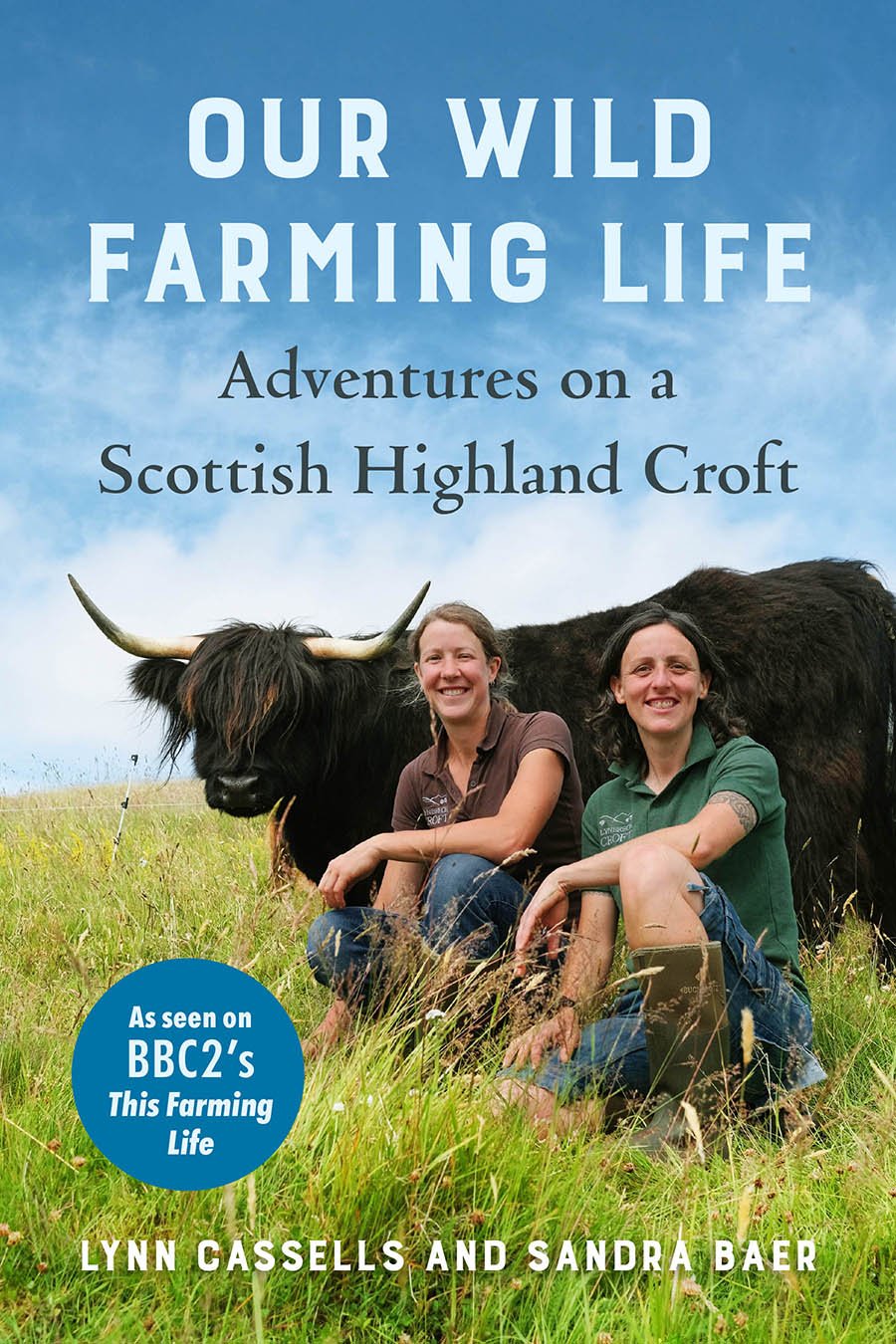
They bought Lynbreck Croft in March 2016 with no experience in farming but a huge passion for nature and the outdoors. Now they raise their own animals, grow their own produce and are as self- sufficient as they can be.
Lured by their desire for a simpler, more sustainable existence, Lynn and Sandra left their friends, family and jobs as national park rangers in England to travel north to Scotland to find a small piece of land they could call their own. They had no money, no plan and no experience in farming. Their idea was to keep a few chickens, a kitchen garden and rent out some camping space, but instead, they fell in love with Lynbreck Croft – 150 acres of wild Scottish Highlands filled with opportunity and beauty, shrouded by the Cairngorms mountains.
At the centre of their work, is a clear mission to grow, source and eat ethical food. Lynn and Sandra discover the freedom and beauty of having time to invest in their own kitchen garden, ‘time isn’t money,’ they say, ‘time is life and nourishment’. But as for all of us, bills keep coming and they need to find a way for Lynbreck to earn them a living as well as feed them.
From the inauspicious beginning of a few hens laying eggs to sell from an honesty box at the end of their track, Lynn and Sandra eventually bring pigs to work their land and learn to raise Highland cattle. Their skills grow daily, from hunting wild deer for their own consumption to butchering and making charcuterie to sell to their local community. In addition to the never-ending chores around the farm, Lynn and Sandra apply for grants, write business plans, set up subscription boxes and egg clubs – becoming accomplished entrepreneurs as well as committed farmers.
Their nature-led approach to farming serves to highlight the shortcomings of our current food system, and the lack of support farmers receive to grow healthy, organic food for their communities. Lynn and Sandra hope this book will go some way to explaining just how much can be gained by understanding and supporting small farmers.
Lynn is originally from Northern Ireland, leaving home at the age of 19 to go to university in Birmingham to study Archaeology and Sandra is from Switzerland, undertaking an apprenticeship at the age of 15 to become a librarian. We met working for the National Trust in the south of England both having made career changes and becoming apprentice rangers. We realised early on of a shared dream to find a plot of land to call our own and live closer to nature. We decided to quit our jobs and head north to Scotland to begin our search. After 2 years, we found ourselves the proud owners of Lynbreck Croft, a 150acre landholding in the Cairngorms National Park and that is where we both live and work today.
We have recently just finished our book Our Wild Farming Life and the first sentence is ‘We never meant to be farmers.’ Our vision was one where we would aim to be as self sufficient as possible; to grow all our fruit and veg, raise our own animals, fell and process firewood for heating, and maybe earn a little alongside by offering some seasonal camping spots for holiday makers. But upon finding Lynbreck, we fell in love with the land and the landscape. At 150acres it was at least 15times bigger than we had been looking for so inevitably our early plans had to change.
We have been here for 6years and it’s only now that we really feel we are finding our feet. We put all of our lifesavings into buying the place, in addition to taking out a small loan to cover the shortfall. Agriculturally, the croft was in a derelict state and so we had to start from scratch. The biggest challenge was finding money to do the work we needed before bringing livestock on. This meant we both had off farm jobs and spent many hours applying for grants and different funding streams. When we look back now at some of the highlights, we’re really proud of what we’ve managed to do; plant nearly 30,000 trees, install 13km of new fencing, renovate an old stone barn and build a new one, renovate the old croft house into a private rental, install our own onsite micro butchery and run a very productive kitchen garden and polytunnel. But we’ve worked hard to get this far!
Whilst the challenges have been numerous, the highlights have been never ending. In fact, the biggest highlight is something we experience nearly every day and that is eating at least one meal where all of the ingredients have come from either produce we have grown and harvested or meat we have raised and butchered. Whilst we ended up working in farming, our passion for self sufficiency has stayed at the core of everything we do and it’s still our main passion and focus.
It’s true that there are more men working in farming than women but our experience has been one where we have never felt anything but welcomed by those around us. We’ve always approached each new project with energy and focus and there is at least one farmer nearby by who described us as ‘hardy lasses’.
When we reflect on the last few years, there is nothing that we would have done differently. All of our decisions and actions have fed directly into where we are today and we feel so fortunate and privileged to live where we live and do what we do. We did however used to feel a lot of pressure to do things as perfectly as we could, beating ourselves up when things didn’t quite go to plan, even for just a minor reason. If we were to give our younger selves advice, it would be to aim for doing our best, rather than aspiring for perfection. And that includes making time for relaxation and giving more value to how important that is. We are much better at that nowadays, meaning we get to enjoy so much more what we have, but can still manage to work efficiently and effectively.
It really is incredible what you can grow in a fairly small space. Our vegetable garden is about 100msq and our polytunnel 40msq. In those spaces combined, we have estimated that we can produce over 90% of all of our annual veg. And we are in a very exposed site at high altitude and latitude. If you get the soil health right and adopt an approach of working with nature and natural processes, you can produce food in abundance. And it doesn’t take much space to keep a few hens who will provide you with daily eggs and install a few water butts to harvest rainwater for watering the kitchen garden. There are so many little things that can add up to having a huge impact and for us, knowing exactly what we eat has become our top priority.
We have lots more plans for our lives at Lynbreck, all of which involve growing and producing more food. We hope to start planting some fruit trees in our fields this year and in the future, are planning a micro dairy so that we can have our own milk, cheese and butter. We’d also like to convert an old stone ruin set into the hillside into a root cellar where we can store more of our summer bounty. We feel so lucky to live in a place that provides us with so much, not just physically but also mentally and spiritually so we can’t ever imagine a time when we won’t have another project to tackle.
Our Wild Farming Life – Adventures on a Scottish Highland by Lynn Cassells and Sandra Baer (Chelsea Green March 2022, £18.99)
The inspirational story of Lynbreck Croft–a regenerative Scottish farm rooted in local food, community, and the dreams of two women.
Lynn and Sandra left their friends, family, and jobs in England to travel north to Scotland to find a bit of land that they could call their own. They had in mind keeping a few chickens, a kitchen garden, and renting out some camping space; instead, they fell in love with Lynbreck Croft–150 acres of opportunity and beauty, shrouded by the Cairngorms and deep in the Highlands of Scotland.
But they had no money, no plan, and no experience in farming.
In Our Wild Farming Life, Lynn and Sandra recount their experiences as they work out what kind of farmers they want to be, learning how to work with Highland cattle, become part of the crofting community, and understand how they can farm with nature to produce food for themselves and the people around them. “Through their journey to becoming farmers,” as The Guardian recently wrote, “it’s clear that nature and the health of the environment plays a central role in everything they do…” And through efforts like these, Lynn and Sandra have been able to combine regenerative farming practices with old crofting traditions to keep their own personal values intact.
Our Wild Farming Life is what happens when you follow your dreams of living on the land; a story of how two people became farmers–and how they learned to make a living from it, their way.

